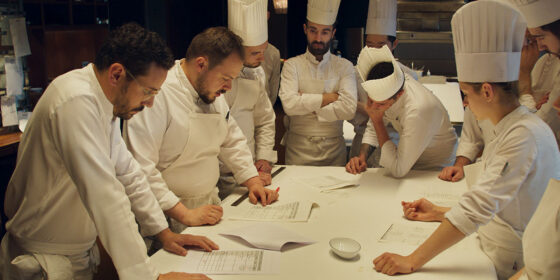TIFF 2023 | Menus-Plaisirs Les Troisgros (Frederick Wiseman, France/ US) — TIFF Docs

By Michael Sicinski
In all likelihood, Frederick Wiseman is already prepping his next project. He is indefatigable. But if it happens that Menus-Plaisirs Les Troisgros is his final film, it would be a fitting capstone to a singular career. After spending most of his filmmaking life producing incisive documentary analyses of dysfunctional institutions and lumbering bureaucracies, Wiseman has more recently been making films that, to put it simply, display the value of human civilization and the effort needed to sustain it. His films on the New York Public Library System, the Paris Opera Ballet, the National Gallery of London, and even a modest gymnasium in Austin, suggest that all is not lost, and that human beings working with a common purpose can in fact produce felicitous outcomes.
Menus-Plaisirs profiles the Troisgros family of Roanne, France, whose patriarch, Michel Troisgros, has carried on the 50-year traditions of the Michelin three-star restaurant, La Maison Troisgros, established by his grandfather in 1930. As Wiseman shows, tradition alone is not enough, and Michel and his wife Marie-Pierre are tireless innovators. Their son César is now the head chef of their current restaurant in the town of Ouches, Le Bois sans feuilles, and over the course of four hours we observe César developing several new dishes. We admire his calm control over the kitchen, and overhear instances when he relies on his father’s palate for a bit of guidance. The film also ducks over to another Troisgros family restaurant, La Colline du Colombier, where son Max is the head chef. (Since this is the 2020s, the family also runs a food truck, Petite Cuisine.)
The “action,” if you will, is culinary, in the sense that the bustle of the kitchens, the preparation of white asparagus, kidneys with passionfruit, or white flowers sculpted from John Dory filets, are relentlessly absorbing. But Wiseman also follows Michel and César on observational errands, speaking to the organic farmer who provides their goat’s milk, visiting one of their primary vintners, or learning about the process of aging cheeses, in great detail. These are moments that might initially feel extraneous or indulgent, until one realizes that Menus-Plaisirs is a slow film about slow food. Wiseman and the Troisgros chefs ask us to recognize that nothing extraordinary is achieved through shortcuts, and that great cuisine is the result of years of artisanal practices and respect for natural cycles. We see the Troisgros chefs listen and learn as frequently as we see them create.
In the final sequence, Michel is seen chatting with some diners. (They are pointedly referred to as “clients,” not customers.) The couple are vinters and discuss handing their vineyards over to their children. Michel’s colleague asserts that his children are making better wines than they ever did, partly owing to the ongoing maturation of the terroir but also because they are applying scientific techniques that were not available to the previous generation. Michel agrees, explaining that while he’s not quite ready to bow out completely, the future belongs to his children and he is optimistic about that. It’s nearly impossible not to perceive Michel Troisgros as an avatar for Wiseman himself, feeling inspired by what has been and will be accomplished by the documentary filmmakers he’s inspired. After decades spent chronicling social collapse and organizational indifference, the last line spoken in Menus-Plaisirs Les Troisgros could serve as Wiseman’s cinematic valediction: “Everything is beautiful.”
Michael Sicinski- « Previous
- 1
- 2


